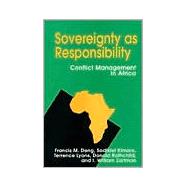Sovereignty as Responsibility Conflict Management in Africa
, by Deng, Francis M.; Kimaro, Sadikiel; Lyons, Terrence- ISBN: 9780815718277 | 0815718276
- Cover: Paperback
- Copyright: 6/1/1996
The authors assert that sovereignty can no longer be seen as a protection against interference, but as a charge of responsibility where the state is accountable to both domestic and external constituencies. In internal conflicts in Africa, sovereign states have often failed to take responsibility for their own citizens' welfare and for the humanitarian consequences of conflict, leaving the victims with no assistance. This book shows how that responsibility can be exercised by states over their own population, and by other states in assistance to their fellow sovereigns.Sovereignty as Responsibility presents a framework that should guide both national governments and the international community in discharging their respective responsibilities. Broad principles are developed by examining identity as a potential source of conflict, governance as a matter of managing conflict, and economics as a policy field for deterring conflict. Considering conflict management, political stability, economic development, and social welfare as functions of governance, the authors develop strategies, guidelines, and roles for its responsible exercise. Some African governments, such as South Africa in the 1990s and Ghana since 1980, have demonstrated impressive gains against these standards, while others, such as Rwanda, Somalia, Liberia, Nigeria, and Sudan, have failed. Opportunities for making sovereignty more responsible and improving the management of conflicts are examined at the regional and international levels. The lessons from the mixed successes of regional conflict management actions, such as the West African intervention in Liberia, the East African mediation in Sudan, and international efforts to urge talks to end the conflict in Angola, indicate friends and neighbors outside the state in conflict have important roles to play in increasing sovereign responsibility.Approaching conflict management from the perspective of the responsibilities of sovereignty provides a framework for evaluating government accountability. It proposes standards that guide performance and sharpen tools of conflict prevention rather than simply making post-hoc judgments on success or failure. The authors demonstrate that sovereignty as responsibility is both a national obligation and a global imperative.






